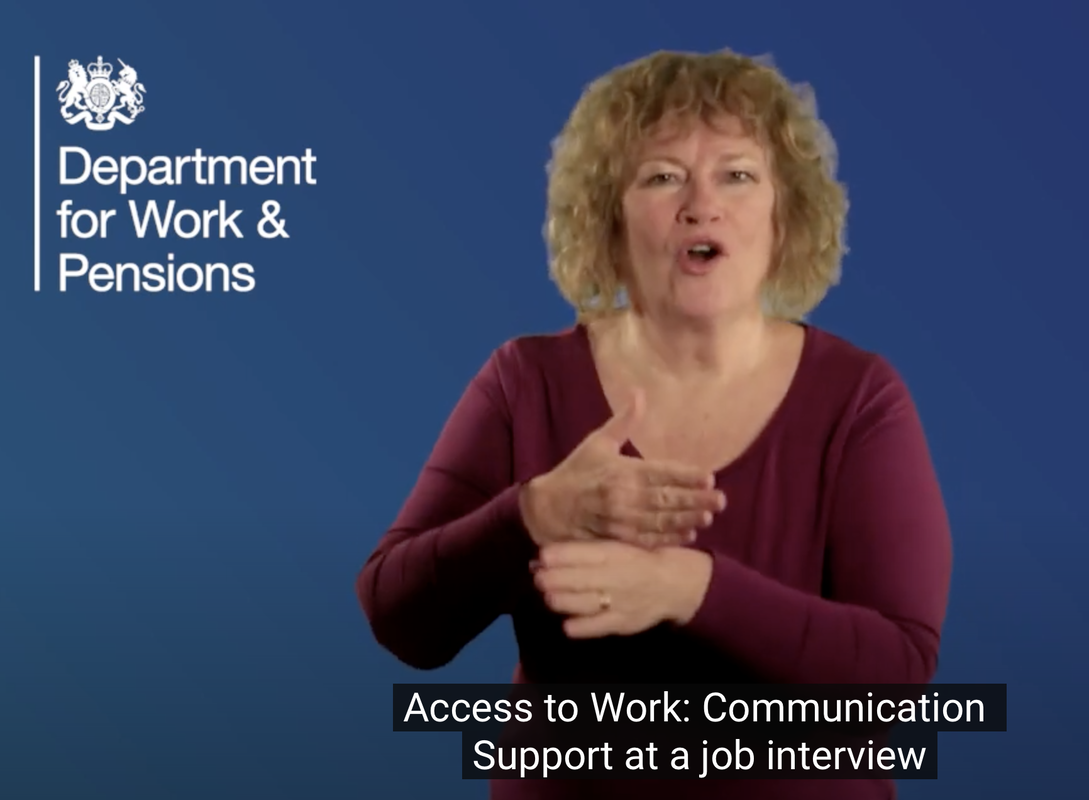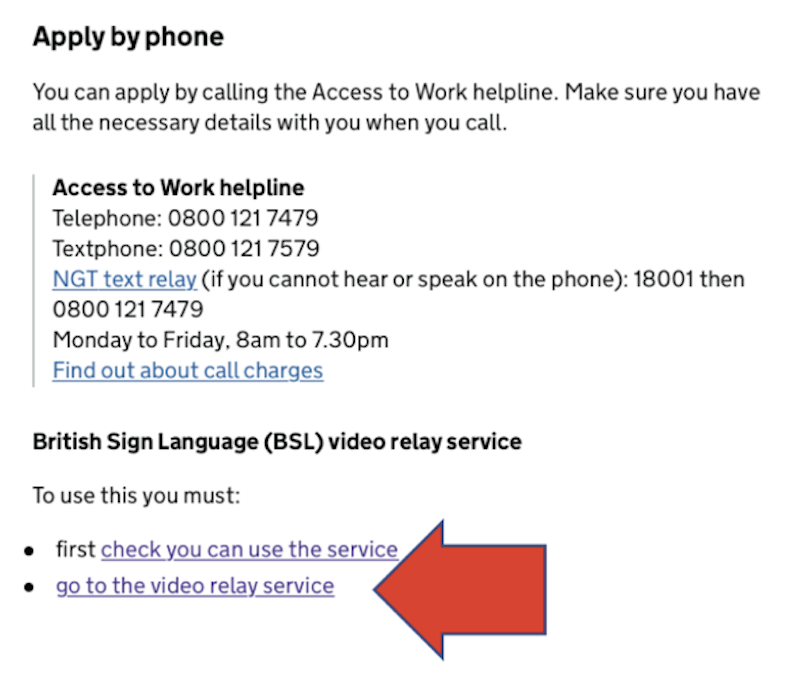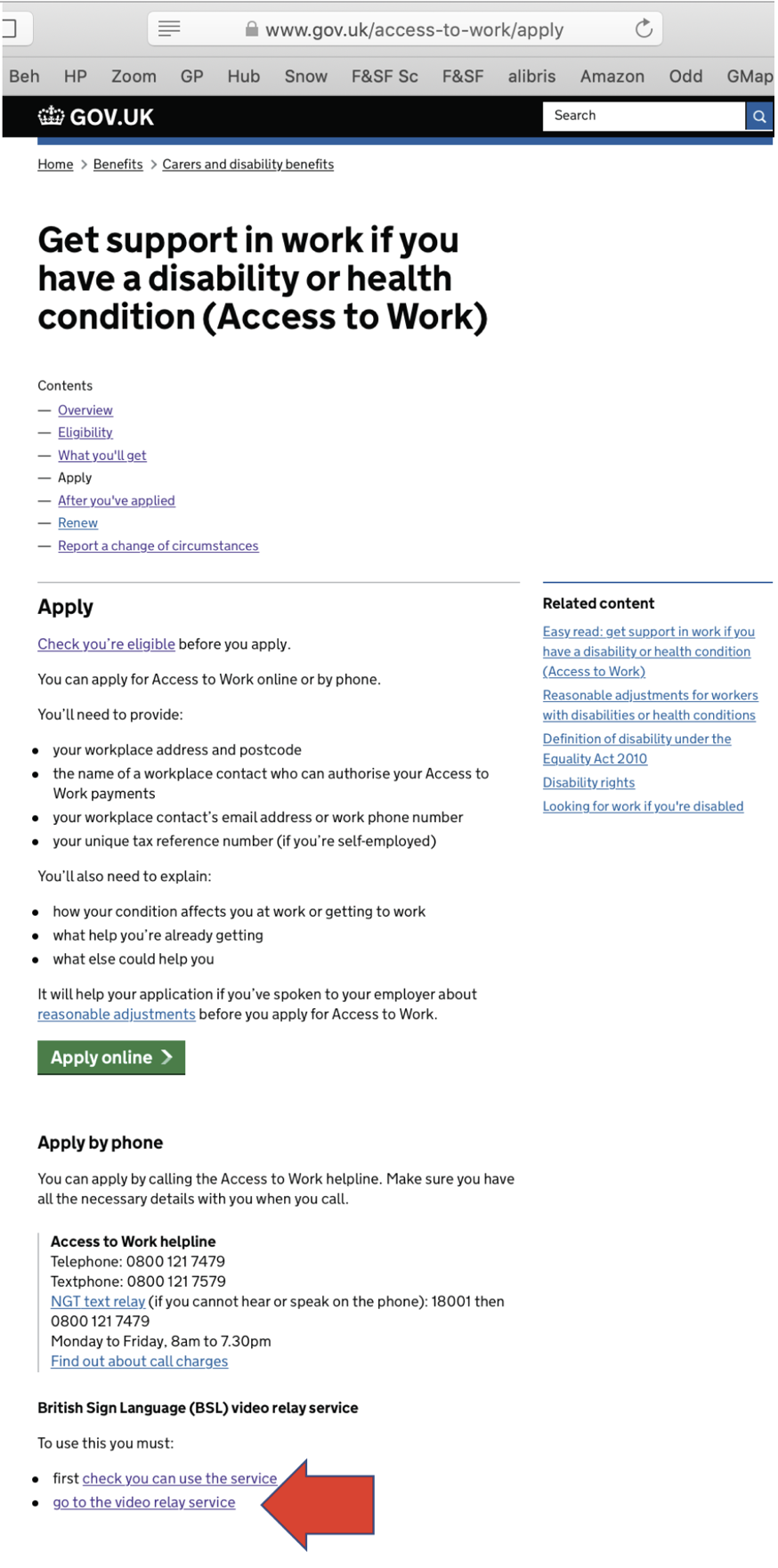| The DWP have information about how you can ask ATW to pay for interpreters etc. for job interviews in BSL and English. (This is called Communication Support at Interview) Click here to watch this information in BSL (YouTube) Click here to read the information in English (.gov website) DeafATW also has more information about applying for Communication Support at Interview that you might find useful. Click here for more information about how to apply for an interpreter for an interview in BSL (DeafATW update) | |
How to apply to ATW for an interpreter for a job interview - information in BSL and English6/24/2021
0 Comments
Click here to see the information in BSL. (This information in BSL was shared by AtW a week after the English information was shared. This is an improvement).
What are the extra changes? (1) If you are working from home, and need extra or different support, e.g. remote interpreting, you can ask AtW for this. (2) If you have health problems that mean you can’t safely use public transport for work at the moment, you can ask AtW for help with transport, e.g. taxis. (3) If you are anxious about going back to work, and need some support, you can ask AtW for some mental health support. You can get support for up to nine months. (DeafATW asked AtW, and AtW said that you can get support in BSL with an interpreter). (4) If you had a letter saying that you are “extremely clinically vulnerable” then AtW will sort out your funding more quickly. Click here to read AtW’s information about these changes in English. DeafATW is now part of the AtW Stakeholder Forum, and also the AtW Easements Working Group8/28/2020 DeafATW was asked to join two groups who work with AtW to help them improve. 1) The AtW Stakeholder Forum. This is a group with people from lots of different organisations. They meet with AtW and bring feedback and suggestions from Deaf and disabled people about AtW. 2) The AtW Easements Working Group. "Easements" is the word AtW uses to mean 'changes". This is group that meets with AtW and looks at the changes AtW makes because of Coronavirus and lockdown. I shared the DeafATW survey with the AtW Easements Working Group. This meant that the problems that Deaf AtW users had, and their suggestions how things could improve, were shared with AtW. Because there had been no information in BSL about the changes to AtW for the first few months of Coronavirus, the Easements Group wrote a letter to Justin Tomlinson, Minister for Disabled People, Health and Work, about improving the way that changes to AtW are communicated in BSL and English. In June DeafATW shared a survey with people on the DeafATW mailing list. We asked three questions and had 40 responses. We can't share the full responses because they are confidential, but you can read our summary of the main themes, issues and suggestions. The three questions were: (1) What changes have AtW made to help with COVID-19 that have been good changes that have helped you? (2) How did you find out about these changes? How clear was AtW information about these changes? How can AtW communicate with you better about changes? (3) What else could AtW have done to meet your needs during COVID-19 and lockdown? Click here to download the summary. AtW have updated their factsheet for customers to include changes they're making to AtW because of COVID-19. www.gov.uk/government/publications/access-to-work-factsheet
These changes are mostly the same as the changes that DeafATW has shared in earlier updates. Please read these updates because I only explain new information in this update. There are four things useful to say about the update: 1) In the Factsheet there is a section with the heading "If your support needs change". It then says "If the support you need changes, for example because you have started to work from home, you need to tell Access to Work." This means that you only need to tell AtW you are working at home if your support needs have changed. If your support needs are the same, you don't have to tell AtW. 2) In the Factsheet there is a section with the heading "Assessments". This says that if you apply for AtW and know what support you need, you don't need a workplace assessment. If you don't know what support you need, an organisation (not AtW) will do the assessment over the phone. Let that organisation know if you need the assessment done in BSL, e.g. through a video interpreting service. 3) In the Factsheet there is a section with the heading "Interpreters". It then says "You need to tell Access to Work if you change the type of support you are using. For example, if you start using an online interpreting service instead of a BSL support worker." This advice looks different from the information that DeafATW shared in an update before. In this factsheet it seems to say that you should tell AtW if you change to use a remote interpreter instead of a face to face one. DeafATW has checked with ATW, and this means that if you stop using face-to-face interpreters and switch to a remote interpreting service and plan to carry on doing this in the future, then you should tell AtW. But if you are just using a remote interpreter because of Coronavirus, and will carry on using face-to-face interpreters in the future, then you don't need to tell AtW. 4) In the Factsheet there is a section with the heading "Claiming for costs". It then says "If you cannot leave home or ask someone else to post your claim for costs, contact your Access to Work adviser and ask if you can send your claim by email. They will tell you what you need to do. You can also send the email from your employer or your support worker by email." This means that if you can't post your claim form you should contact your AtW adviser and ask them how you can email your claim form to AtW. This information has been checked with AtW. This information has been updated to say that the advice in the earlier AtW update is still correct after the updated customer factsheet was published. (For number 3 above). You can now make a new AtW Application, or apply for for your AtW Renewal online.
https://www.gov.uk/access-to-work/apply https://www.gov.uk/access-to-work/renew You can do this online in English, or scroll down the Communication Support for Interview page until you see "British Sign Language (BSL) video relay service". (See screenshot below) If you use the video relay service (in ATW working hours) you will be connected through a BSL interpreter to an ATW adviser, who will complete the online application with you. If you have any problems, email SignVideo at help@signvideo.co.uk If you haven’t used this before, then first watch this video that explain how to use the service (in BSL and English). It may look complicated, but isn't really. Click here to watch the video on YouTube. DeafATW recommends that at the end of your call with AtW, you ask the AtW call centre or AtW Adviser to send you an email summarising what has been discussed and agreed. You should also keep notes of the what was said and agreed on the call. This is in case later the AtW Adviser says something different has been agreed. 30th July 2019
If Deaf people need to complain about Access to Work, they can do this using BSL in two ways. (1) Click on the link for the Video Relay Service, on the apply pages on Gov.uk: https://www.gov.uk/access-to-work/apply. This will connect you to the interpreter. (See screenshot below). When you get through to the Access to Work Enquiry line, let them know that you want to make a complaint. They will take details of your complaint, and pass it on to the AtW Complaints Team. (2) If you have received emails from an AtW advisor then there will be a link and 4 digit number at the bottom of the email. If you click on this link you will be connected to the Video Relay Service. Give the interpreter the four digit number from the email, and they will connect you to the AtW adviser. Tell the adviser that you want to make a complaint. DWP are making BSL videos about the AtW Reconsideration and Complaints procedures that should be available by the end of the year. Please let DeafATW know if you try to make a complaint in BSL.
21 September 2014 (posted on NRCPD site 19 August 2014)
This information has been copied from the NRCPD site. "NRCPD has been told Access to Work advisers are asking to see the qualifications of communication professionals. In particular, they are asking for confirmation they have a level 6 qualification. As well as being an unnecessary administrative burden, not all registrants have a level 6 qualification. That may be because they registered when a level 6 qualification wasn't required. Or it may be because a level 6 qualification isn't required for that register. We have explained this to Access to Work. We have also said there is no need to check the qualifications of NRCPD registered communication professionals. Their fitness to practise is guaranteed by their registration. If an adviser asks to see your qualifications or the qualifications of a communication professional you are supplying, please feel free to use this template letter." Click to go to the NRCPD page. There is more information there about this. You can download the template letter below, or from their page. Click here to download the NRCPD's template letter (a letter ready for you to add your name and address and send to your AtW Adviser) |
UpdatesUpdates have been moved to this Blog, so that you can search by categories. Archives
March 2024
Categories
All
|



